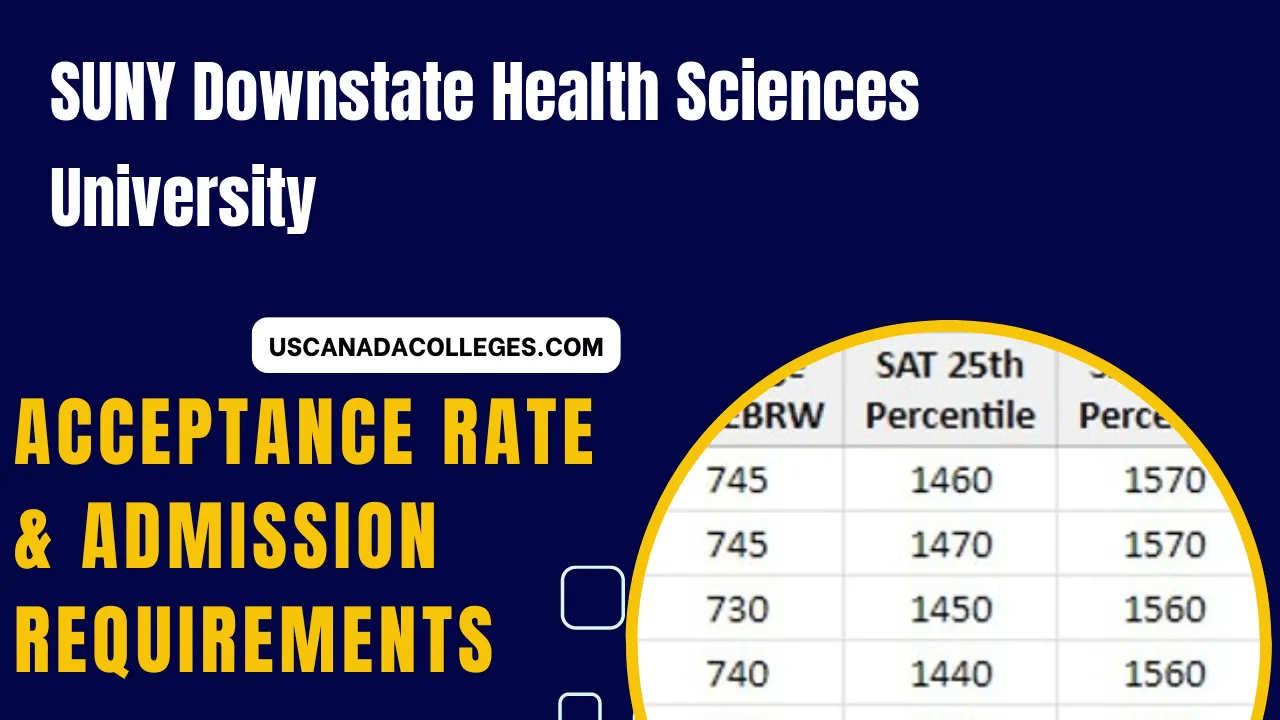The acceptance rate of SUNY Downstate Health Sciences University is not reported. The admission process at SUNY Downstate Health Sciences University is not very strict. Most institutions whose acceptance rate is not reported do not have a high acceptance rate. Hence, we may assume that SUNY Downstate Health Sciences University's admission criteria are not very strict. However, this does not mean that every applicant will be admitted.
To secure admission to SUNY Downstate Health Sciences University, perform well in academics and other activities. Meeting SUNY Downstate Health Sciences University's GPA and standardized test (SAT/ACT) requirements is crucial, as failing to do so may prevent your application from moving forward. Additionally, a well-written letter of recommendation, your participation in co-curricular and extracurricular activities, and your interpersonal communication skills can improve your chances of admission.
SUNY Downstate Health Sciences University Admission Requirements
Can I Get Into SUNY Downstate Health Sciences University Without SAT Or ACT?: The admission test score (SAT/ACT) policy for SUNY Downstate Health Sciences University is unknown. But it is better to submit the test score if you have performed well in the test. It gives an extra opportunity to showcase your skills and competencies and hence will improve your chances of admission. Check the schedule of the test and plan accordingly. It is advisable to appear multiple times in the test unless you score well above the average SAT / ACT score of the admitted students, as given below. Normally, students may appear in the test 4 to 5 times to improve their scores. But if your score is not up to the mark and is less than the national or state average, then it is better not to submit the score as it will impact negatively.
SUNY Downstate Health Sciences University SAT Requirements
Each school has different requirements for SAT and ACT testing. Only a few schools require the SAT or ACT, but many consider your scores if you choose to submit them. The test score policy is already mentioned.
SUNY Downstate Health Sciences University Profile
Name: SUNY Downstate Health Sciences University (SUNY Downstate Health Sciences University)
Accredited by: Middle States Commission on Higher Education (MSACHE)
How can I get a scholarship?
7.77% of the students are receiving Pell Grant and 41.45 percent are receiving Federal Grants. So it is a better choice to go to SUNY Downstate Health Sciences University and apply for PELL or federal loan grants.
At SUNY Downstate Health Sciences University, you will have no problem receiving any scholarship from the federal government. Fill in the FAFSA application form at the earliest and enlist SUNY Downstate Health Sciences University as your choice in the form.
How much a SUNY Downstate Health Sciences University Graduate make?
The average annual salary of the SUNY Downstate Health Sciences University graduate after 4-6 years of graduation is USD 109601. An average SUNY Downstate Health Sciences University graduate makes this much after 10 years of enrollment (4-6 years after graduation).
The average annual income of a graduate in the United States is USD: 40595
Degree Programs
Bachelor Degree Programs
- Allied Health Diagnostic, Intervention, and Treatment Professions
- Health and Medical Administrative Services
- Health Professions and Related Clinical Sciences
- Health Services/Allied Health/Health Sciences, General
- Registered Nursing
Masters Degree Programs
- Allied Health Diagnostic, Intervention, and Treatment Professions
- Alternative and Complementary Medical Support Services
- Biochemistry, Biophysics and Molecular Biology
- Bioethics/Medical Ethics
- Cell/Cellular Biology and Anatomical Sciences
Frequently Asked Questions About SUNY Downstate Health Sciences University Admissions
Answer: Graduates of this university typically earn a high salary, $109601 annually, depending on the industry.
Question: What are my chances of getting a scholarship at SUNY Downstate Health Sciences University?
Answer: Your chances of getting a scholarship are lower, 50% or less. It's important to apply early and showcase a strong academic profile.
Question: Is it possible to transfer to SUNY Downstate Health Sciences University from another university?
Answer: Yes, many students successfully transfer to SUNY Downstate Health Sciences University each year. Be prepared with your academic transcripts, recommendation letters, and a solid personal statement to make your application competitive.
Question: What is the campus culture like at SUNY Downstate Health Sciences University?
Answer: The campus culture at SUNY Downstate Health Sciences University is diverse and vibrant, with numerous student organizations, sports teams, and cultural activities. It’s an ideal environment for personal growth and building lifelong connections.
Question: How can I improve my chances of getting into SUNY Downstate Health Sciences University?
Answer: To improve your chances, focus on excelling academically, building a strong extracurricular profile, and submitting standout essays. High SAT/ACT scores are also crucial for competitive admissions.
Full list of All degree programs offered by SUNY Downstate Health Sciences University.
Data on this page is sourced from IPEDS, College Scorecard's latest data as provided in 2025, US Department of Education's latest 2025 statistics, Institute's official websites and printed material as well as additional publicly available sources.
